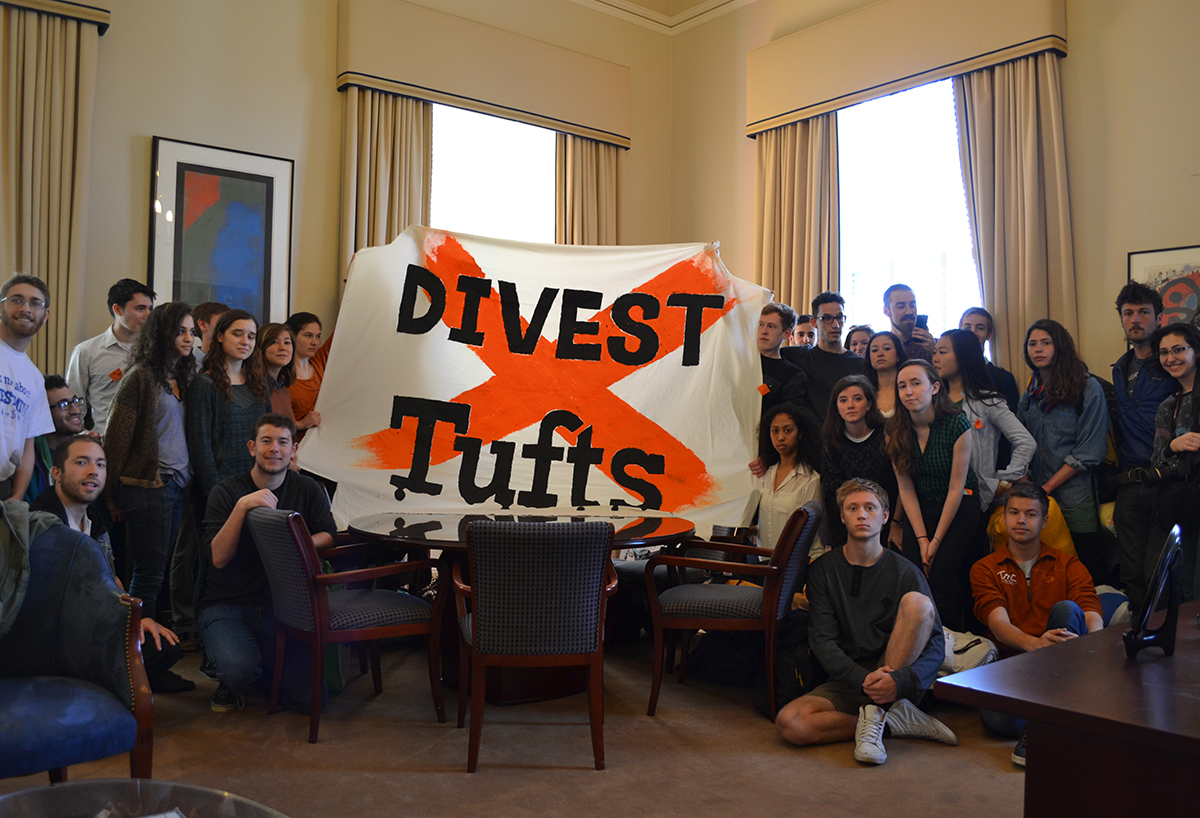On Earth Day, Tufts Students Stage Sit-In to Demand Divestment [Updated]

Photo by Chris Delawder Provided
Update, Thursday, 1:12 p.m.:
A Tufts spokeswoman provided the following comment regarding the administration not allowing food to be delivered to the students: “Students chose to disregard university policy by entering and occupying a private office despite clear instructions by Tufts public safety officers not to do so. Having made that choice, they are not able to have food delivered. They do have restroom facilities and water. Our executive vice president met with the students early this morning and will continue that dialogue.”
Tufts Climate Action has said it will host a press conference in President Anthony Monaco’s office on Friday morning.
Update, Thursday, 11:20 a.m.:
The sit-in continues as of Thursday morning. The protesters met with Executive Vice President Patricia Campbell for a round of negotiations this morning, though the outcome was not what Tufts Climate Action was hoping for.
“We met with Patricia Campbell this morning…and she was adamant that no food will be delivered,” sophomore Brian McGough told Boston.
Campbell also made it abundantly clear that the university will not host a public forum on the issue of divestment, McGough said.
The group of 33 students and alumni is slated to again meet with Campbell at noon today for another round of negotiations. “We have enough food for approximately three days,” McGough said. “We are going to keep pushing.”
Previously:
Wednesday morning, nearly three dozen Tufts University students and alumni entered Ballou Hall and launched a sit-in at University President Anthony Monaco’s office. The students, most of whom are members of a group called Tufts Climate Action, are demanding that the university immediately divest its holding in publicly traded fossil fuel companies.
“The administration has been very resistant,” said Brian McGough, a sophomore international relations major and member of Tufts Climate Action. “We will stay here until the administration commits to negotiating with us…We are going to make it very hard for them to say no to divestment.”
Approximately 5 percent, or $80 million, of Tufts’ $2 billion endowment is currently invested in fossil fuel firms. McGough says that Tufts’ Executive Vice President Patricia Campbell has been among the most vocal opponents to divestment, consistently falling back on the argument that divestment would threaten the solvency of the university.
“Tufts University recognizes the diversity of opinions on the subject of divestment and welcomes continued discussion that is thoughtful and respectful,” read a statement provided by the university. “The university is strongly committed to environmental sustainability. Last year, a university-wide Divestment Working Group carefully examined the question of divestment from fossil fuels. The Working Group, which included students, trustees, faculty and staff, concluded that, given our co-mingled investment model, divestment would likely result in a significant reduction in operating funds.”
That assertion, common across many universities dealing with divestment protests, is increasingly coming under fire. Earlier this month, The Guardian reported, citing a report from MSCI, that “investors who divested from fossil fuel companies would have earned an average return of 13% a year since 2010, compared to the 11.8%-a-year return earned by conventional investors.”
It’s been a busy month for divestment activists across the city, from Boston College to Harvard University. Wednesday’s sit-in at Tufts was further amplified by a rally on the Medford campus in the afternoon that focused on climate change and divestment.
McGough said he has serious ethical qualms about how his tuition is spent and how the endowment is leveraged. “Climate change is an issue of international environmental justice. I feel uncomfortable with my university’s decisions to invest in these companies. It is a political statement to invest in fossil fuels.”
As for the sit-in kicking off on Earth Day, McGough says it was a convenient coincidence. “This is a month of escalation [for divestment activists], and this is just one of the many actions we’re taking against the administration,” he said. “Being part of that movement is more important to us than Earth Day.”
Shortly before 4 p.m., McGough and his colleagues were still in Monaco’s office. He said that he could see campus security outside the door. It is unclear how they university plans to extract the protesters, but McGough insisted they’re staying until the university engages in meaningful negotiations on the issue.


